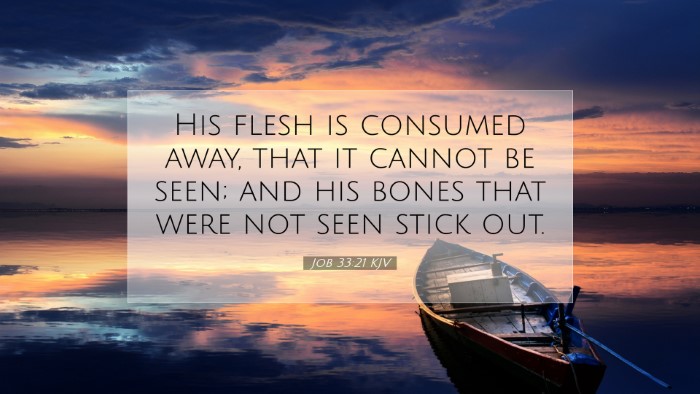Commentary on Job 33:21
Job 33:21 states, "His flesh is consumed away, that it cannot be seen; and his bones that were not seen stick out." This verse captures a moment of profound physical suffering and despair, conveying imagery of a body ravaged by illness or affliction. Within this context, various commentaries shed light on the deeper theological and existential implications of this passage.
Summary from Matthew Henry
Matthew Henry highlights the plight of human suffering as central to his exposition on this verse. He notes that the physical state of one’s body reflects a deeper spiritual and emotional condition. Henry suggests that the "flesh consumed" represents the complete degradation of the physical form, often indicating a life's struggles that can lead the individual into despair or even a feeling of abandonment by God.
Moreover, Henry emphasizes God's communication and revelation to humanity during such times of suffering. He posits that while the afflicted may feel invisible to others, God is acutely aware of their condition and can use affliction as a means to awaken the soul to a greater reliance upon God’s mercy. This relational aspect of suffering forms a critical pillar of Henry's interpretation.
Insights from Albert Barnes
Albert Barnes approaches the scripture with a focus on its literary style and theological weight. He correlates the description of the body with the inevitable decay that all humans face, understanding it to be a metaphor for spiritual decay when one strays far from God’s truth. Barnes underscores that the physical depiction of suffering is not merely for shock value; it is a poignant reminder of the severe consequences of sin.
He also notes that the verse communicates the darkness that overshadows the afflicted. The portrayal of bones that “stick out” serves to illustrate extreme fragility and vulnerability in both the physical and spiritual sense. Barnes articulates that the essence of human suffering is often accompanied by a search for purpose, and in this search, divine intervention becomes crucial. The Lord seeks to restore wholeness, not just physically, but spiritually as well.
Reflections from Adam Clarke
Adam Clarke's commentary adds another layer by discussing the implications of this verse in the greater narrative of Job. He argues that this vivid description serves as a pivotal element within Job’s dialogue with his friends, showcasing the difference between true wisdom and earthly experience. Clarke suggests that societal perceptions of suffering often lead to incorrect evaluations of one's righteousness or standing before God.
Furthermore, Clarke stresses the importance of recognizing that bodily suffering may not always be a direct consequence of personal sin, as is posited by Job’s companions. He argues that God's dealings with humanity in suffering can often lie beyond human understanding. Clarke ultimately encourages an attitude of humility and recognition of God’s sovereignty, especially in the face of inexplicable suffering.
Theological Implications
This single verse encapsulates subjects such as human frailty, the reality of suffering, and the mystery of divine providence. Through the combined insights of Henry, Barnes, and Clarke, a few theological implications emerge:
- The Reality of Suffering: This verse emphasizes that suffering is an intrinsic part of the human experience, urging readers to grapple with its inevitability.
- Divine Awareness: Despite appearances to the contrary, God is intimately aware of each individual’s suffering. His actions may not always be aligned with human expectations, but His purpose is deeply rooted in love and redemption.
- The Nature of Restoration: The path through suffering leads to transformation. Hence, understanding God's intent during these periods is crucial for spiritual growth and healing.
- Human Humility: Suffering requires a recognition of one’s limitations and the vastness of God’s wisdom. Faith invites believers to trust in divine timing and provision.
Conclusion
Job 33:21 serves as a powerful reminder of the complexity of the human condition. Through the lens of public domain commentaries, this verse not only beckons a reflection on physical suffering but also challenges spiritual perspectives regarding faith, redemption, and divine interaction in moments of despair. Pastors, students, theologians, and Bible scholars should approach this text with reverence, considering both the emotional depth it conveys and the broader theological principles it showcases.


